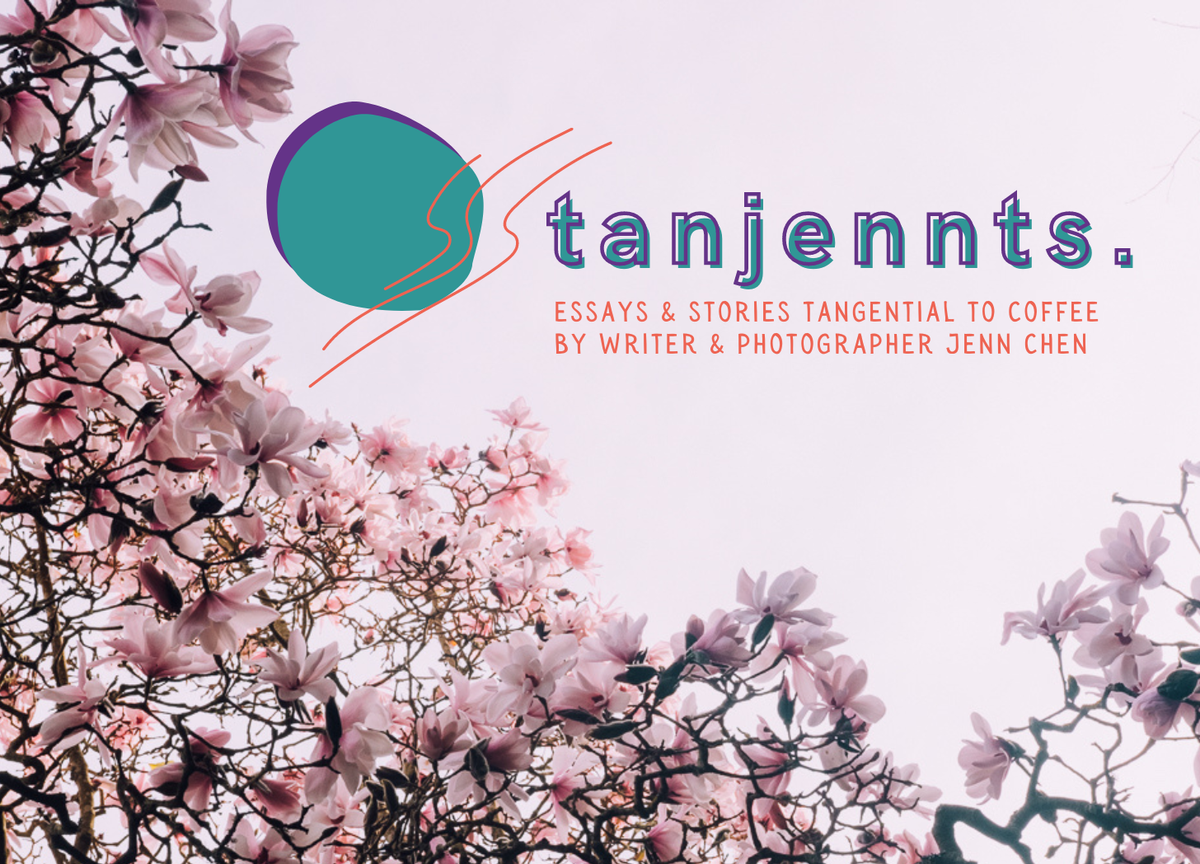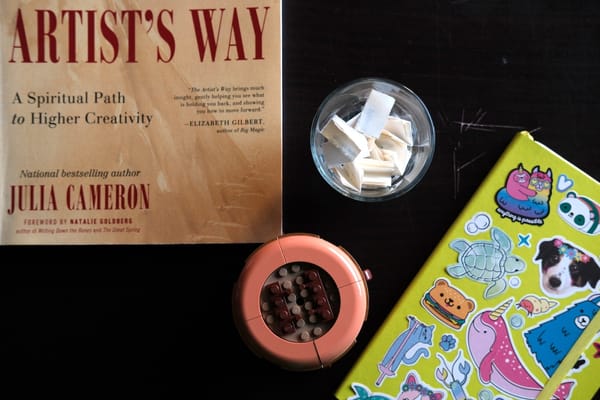Why I moved from Substack to Ghost

📝 Notes from Jenn:
There's been a refresh of sorts here. The tl;dr is that I've moved tanjennts over to run on Ghost. It'll take some time for me to get things organized, updated, and sorted through. Thank you for your patience. If I moved it correctly, you should be seeing this without any issues. The only point of friction is that if you want to leave a comment on a post, you'll need to create an account with the email address you use to receive posts.
I'm also in the first week of my anti-anxiety med updose and, for the most part, the adjustment has been pretty smooth! It's a little too early to tell if it's working.
My writing was nominated in the Best Writing category for the Sprudgies! You can view all the nominees here and vote for your favorites.
📜 Published: Behind-the-scenes on what it's like to represent a coffee company on a reality TV competition show. I spoke to four businesses and watched a lot of episodes to see what it was like for the owners after their shows aired. Fun fact: this article was prompted by learning that two past interviewees had gone on to be on reality TV.

🛠 Current project: Getting this Ghost site's pages and backend setup to reflect my Substack settings.
🔏 Last week, paid subscribers received a reflection on giving more compliments this year.

🍩 What I ate/drank/snacked on: Pixlcat Coffee opened a new location by me, so I dropped in for a visit and picked up some really tasty mochi muffins! Flavors: chocolate, black sesame, and ube.


On why I moved off Substack
I hate writing these kinds of posts, nearly as much as I hate the actual actions I have to take. It feels like one of those unnecessary “Hey, guess what! We updated our website; go check it out!” posts. But because this is a newsletter and a number of subscribers came via the Substack network, a little explainer is needed.
On November 28, Jonathan M. Katz wrote about Substack’s Nazi problem, and in response, Substack writers organized an open letter. Which was pre-empted by a pro-Substack open letter. I didn’t join in the open letter, mainly because I was burnt out, and I didn’t think it would drive any change. I know it takes a lot to organize this type of open letter, but I didn’t see any sort of consequence noted (e.g. “If you don’t commit to removing pro-Nazi content, I will leave Substack.”). History has shown that Substack leadership enjoys a hands-off approach to content moderation.
Katz has moved off Substack, taking his 13k+ subscribers with him. Another top-performing Substack, Platformer, also moved away. Casey Newton wrote to his 174k+ subscribers, “Substack’s tools are designed to help publications grow quickly and make lots of money — money that is shared with Substack. That design demands responsible thinking about who will be promoted, and how.” And Newton’s reasoning here is one of the reasons why I moved off Substack.
Substack co-founder Hamish McKenzie wrote in a note: “I just want to make it clear that we don’t like Nazis either—we wish no-one held those views. But some people do hold those and other extreme views. Given that, we don't think that censorship (including through demonetizing publications) makes the problem go away—in fact, it makes it worse.” This is categorically false. If given the space to grow, the people will come and spread the hate. Research shows that deplatforming websites works to interrupt organizing and search engine popularity rankings.
A lot of people wrote about this, including The Handbasket, that I would encourage you to read. I know some say that you could work from within and make changes. My organizing experience tells me that yes, you could do this, but only if the leadership is willing to make the change. If the cofounders did not hold these views of a hands-off moderation approach and that free speech equates to all speech, I think I would be more optimistic about change.
When I moved from Revue to Substack, I was impressed by the writer support that they provided. I went through the free Substack Grow program, participated in the weekly writer hours, and even joined a Discord server of writers. But then they introduced Substack Notes when Twitter was starting to decline, expanded on recommendations and referrals, and added more growth features. I stopped joining in the writer threads because I kept seeing anti-Semitic comments—very blatant and left up, unmoderated for hours.
This leads me to the other reason why I’m moving off. I have seen too many features get introduced onto this platform without much forethought or introduction.
My first warning was the “Boost” feature. It promised to help you grow your audience by sending perfectly timed emails to subscribers, encouraging them to upgrade. There was only one help article on this and no information on how often these emails went out. What if someone got an upsell and your newsletter issue at the same time? That would be an annoying subscriber experience!
Next was the Notes network. Many of my email readers are not on Substack. You signed up via email and expect only email. When Notes was introduced, every writer got the Notes profile. And if you had a publication, every person who signed up showed up, with their name, under your profile’s “subscribers.” This was defaulted ON, in what I would say is a breach of trust.
Most recently, I found the AI training feature in settings was also defaulted as turned on. You have to go into your settings to block AI training. I know there are different writer stances on AI training, but this seems like one of those settings that is better to be an active opt-in from the writer side.
So, after much research and consideration, I have landed on Ghost. I used their migration tool and was able to import all of my content and subscribers over. I have a lot of work to do on it still: fixing broken links, uploading featured images, setting up pages, etc. But the more I explore it, the better I feel about this choice. The wide variety of cards that they have is neat, along with the reusable snippet feature. It’s possible that the future look of tanjennts will be that only the articles will be posted online, and everything before & after will use email content cards that only show up when the post is emailed out.
The push to Ghost I needed was knowing that it’s open-source software and a nonprofit. This makes it much harder to collapse and means it’s not open for tech venture capitalist money.
In general, not much will change for you, the reader. You’ll still receive this email biweekly. If you signed up for specific sections, I’ll be adding those back in. For commenting privileges, you’ll need to create an account. Let me know if you have issues with creating accounts or subscribing.

👀 interesting reads

Digital platforms take away agency from the business owners, pressuring them to follow in lockstep rather than pursue their own creative whims. There’s a risk as well in hewing too closely to trends. If a trope becomes stale, the algorithmic audiences won’t engage with it, either. That’s why the perfect generic coffee shop design keeps changing slightly, adding more potted plants or taking a few away. In the algorithmic feed, timing is everything.

Synthetic diamonds are "all but untraceable and already infiltrating the market to an extent that the diamond dealers would prefer not to admit," The Guardian reported. When speaking of diamond dealers — and the diamond "cartel" — there is one corporation at the top of the list: De Beers.
The Claudine Gay Debacle Was Never About Merit [NYT-hopefully freemium]
Rufo says he smuggled a narrative into “the left-wing media.” That narrative rests on a critical discursive link — D.E.I. is synonymous with “lacking merit.” It is a neat trick. Harvard’s endowment has been valued at nearly $50 billion. Yet the Rufo messaging strategy successfully painted the institution’s president as an undeserving beneficiary, even if she is not.


I wondered how many of Clark’s alleged victims were aware of his disappearing act. I pondered where all that money could’ve gone, but a larger question also nagged at me: Who was Aaron Clark, anyway? The Denver Post had only traced his history as far back as 2018. I did some research, but my initial efforts yielded nothing more. The details of Clark’s life before 2018 remained a blur.











